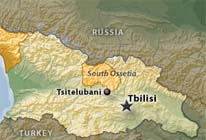Russia-Georgia conflict: Bush administration turns cautious
 Washington, Sept. 9 : The Bush administration has decided to adopt a low-key approach to the recent conflict between Russia and Georgia.
Washington, Sept. 9 : The Bush administration has decided to adopt a low-key approach to the recent conflict between Russia and Georgia.
According to the Washington Post, this strategy is premised on working jointly with European allies, and on avoiding the sort of unilateral U. S. military threats that would scare them off.
The centerpiece of the policy was last week''s announcement that the United States will rush up to one billion dollars in humanitarian and reconstruction aid to Georgia, but won''t immediately provide new military assistance to rebuild the Georgian army, as some in Tblisi and Washington had hoped.
The policy is aimed more at avoiding a new Cold War, rather than encouraging one, claims the paper.
By focusing on civilian assistance, the Bush administration is sending several messages: It is reassuring Europeans that it won''t militarize the Georgia crisis and turn it into a U. S.-Russian confrontation; at the same time it is cautioning Saakashvili to go slow, and avoid more self-defeating provocations against Moscow.
The larger dilemma facing the administration is how to show Russia that it made a serious mistake in invading Georgia, without making Moscow feel even more isolated and aggressive.
In the view of administration officials, the new Russia has one foot in the 21st century and a growing stake in the global marketplace. But Prime Minister Vladimir Putin, who has been driving Georgia policy, is seen by Washington as having his other foot in the 19th century -- with an outmoded "great power" mystique about Russia''s interests in which he sees control of physical space as the key to security and stability.
Russia has paid a big economic cost over the past month for Putin''s atavistic strategy. The Russian ruble has fallen sharply, forcing the central bank to intervene to bolster the currency. The Russian stock market has also tumbled, with the benchmark RTS index losing about 290 billion dollars in value since August 7.
Frightened by Putin''s adventurism, investors have pulled as much as 21 billion dollars out of the country over the past few weeks, according to a Goldman Sachs report cited Friday by the Financial Times.
The administration wants to keep Putin from driving Russia off a cliff.
They view his successor, President Dmitry Medvedev, as a man who understands that Russia''s future is as a 21st-century power. They want to avoid a strategy that unintentionally undermines Medvedev and bolsters the Putin camp. (ANI)